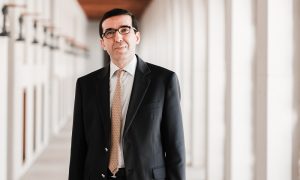Interview: Andrew Mackenzie, partner at Baker McKenzie Habib Al Mulla
Developing a firm’s construction arbitration practice and where the region’s industry is headed

“That’s what’s very typical of this region, especially on government-related projects. They’re told that everything will be fine, but then they get to a level where the budget isn’t there to clear these costly claims”
At the start of the year, international law firm Baker McKenzie Habib Al Mulla announced that it had expanded its capabilities in the GCC region through the appointment of Andrew Mackenzie as partner in its UAE Arbitration practice. Coming off the back of a recent shake-up of the UAE practice, the appointment of Mackenzie was hailed by executive chairman Dr Habib Al Mulla, who said the move would allow the firm to support clients operating in the Middle East through the lifecycle of their operations, from structuring and advisory all the way through to dispute resolution.
Joining Baker McKenzie Habib Al Mulla from Hogan Lovells in the UAE, Mackenzie brings with him an expertise in international arbitration law, with a particular focus on construction, engineering, energy and insurance disputes. He has been based in the UAE for more than eight years and has full rights of audience in the Dubai International Financial Centre courts, and has also been admitted as a solicitor in both his native Scotland and England and Wales, where he is also a solicitor advocate in the higher courts.
Mckenzie acts for international corporations and governments across the Middle East, Africa and Asia on complex commercial disputes under a variety of civil and common law systems, having tried cases in all of the major arbitration forums (both treaty-based and commercial), representing developers, contractors and consultants from around the world for a variety of projects.
With the senior leadership of Baker McKenzie Habib Al Mulla determined to establish the firm as a leader in construction arbitration across the GCC and wider MENA region, Mackenzie’s expertise and experience is invaluable to their plans for expansion and growth over the coming years.
“Myself and Dr Habib have one vision, which is to ensure that the team based in the UAE works regionally – more so than we already do. We focus on working in Saudi Arabia, in conjunction with our colleagues there, in Bahrain, Kuwait and Muscat – across the GCC and the wider region. Baker McKenzie benefits from the fact that we’ve got a very hefty footprint in Africa – we’re in Johannesburg, Cairo and Casablanca – and because of that, we can tap into the MENA region, the northern African states, where there are more than a trillion dollars worth of projects ongoing,” Mackenzie says during an interview with Big Project ME at the Baker McKenzie Habib Al Mulla offices in Business Bay, Dubai.
“It also means that we can become a legal hub. We’re already a business hub for sub-Saharan Africa. We want to be seen as, both externally and internally, a centre of excellence for arbitration across all industries,” he continues.
Having been brought in to head the international arbitration and construction team, Mackenzie aims to put a particular focus on disputes, arbitration and litigation. With seven lawyers under him – soon to be eight – all construction and arbitration specialists themselves, he hopes to put in place a team that will offer a range of services and expertise to clients from all over the region.
“I also do front-end construction work as well, I know my way around ECP contracts and the drafting of the usual standard forms. The team ranges in levels as well, which is good, because I obviously can’t be everywhere at once. Dr Habib is a very well-known arbitrator and UAE law expert, and the calls on his time are very demanding as well.
“But the nice thing is that we have a wonderful synergy at Baker McKenzie Habib Al Mulla. We have the local law experience – by that I mean all regional local laws – we have the common law background – which is mine – and we obviously have the construction and engineering arbitration expertise. We’re also trying to be multilingual as well, which helps. It means that we can tender for work that would usually fall outside my remit, because proceedings are usually conducted in Arabic or because it’s for a particular client in a style or culture that other international firms would find it difficult to adopt into.”
Having moved to Dubai at the tail end of 2009, Mackenzie had a first-hand look at how the construction industry in the region operated right when external pressures were at the highest levels. With the real estate market in collapse, he was able to focus on the construction boom disputes that inevitably arose.
“It was chiefly construction disputes at the time. Projects like Dubai Mall and the Dubai Airport – that’s probably one of the most heavily litigated buildings in the world. I think everyone has been involved in it, one way or another. I cut my teeth on some very sizeable and complex disputes, involving multiple parties on the contractor, consultant and government end as well. It was nice to have that experience and exposure to all the different sectors and the different viewpoints in the industry.
“From there, I broadened my practice to a degree, focusing on services beyond construction to other general commercial disputes as well. Arbitration was about 90% construction and engineering-related, and I picked up a number of disputes that were typically main contractor, subcontractor and developer. But then I started doing work for architects and engineers, which then involved the insurers – who are a very active and often neglected part of the construction industry,” he says.
“People don’t often see things from an insurer’s perspective, so it was fascinating to gain that insight and see how disputes that are on the face of it very clearly construction disputes often evolve into very complex coverage claims under contractual risk or professional indemnities policies.”
This experience is likely to stand him in good stead, given that the last few years have seen a slump in performance for the regional construction market. While experts predict that 2018 is likely to see an increase in project awards in Saudi Arabia and the UAE, the region is still grappling with the issue of funding for developments. As a result, the likelihood of disputes and arbitration in the industry is likely to increase, especially since Mackenzie says one of the fundamental lessons from 2009 still hasn’t been learnt – the importance of adhering to a contract.
“Sometimes these parties take months, if not years, to negotiate and sign these documents. They can run into hundreds of pages, with many different schedules, and then typically what happens is that the client takes it and sticks it into a drawer [and forgets about it]. They just never read it, and they forget that the contract is supposed to be the fundamental basis upon which they’re delivering their project.
“And when they forget about it, it ultimately leads to disaster because they forget to put notices in and they forget to comply with the provisions of the contract. You do have this honeymoon period when both parties get on really well and neither party wants to break that by appearing too contractual or notice-oriented, but what that ultimately leads to is smaller issues building up, snowballing and becoming global claims that ultimately lead to large-scale arbitration, because the parties are poles apart.”
Despite having been very successful at arbitration for the last twelve years, Mackenzie insists that if he can stop a client from going into arbitration, he always will. Not only is it an all-consuming process, it is also time-intensive, costly and rarely results in both parties walking away fully satisfied with the result.
“That’s what’s very typical of this region, especially on government-related projects. They’re told that everything will be fine, but then they get to a level where the budget isn’t there to clear these costly claims. This leads to another issue – communication. Because these claims aren’t going through, because these warnings aren’t coming in to the people with the purse strings, they then turn around and say, ‘Well, we’ve paid $2.4 billion for this project, but now you’re saying it’s going to cost $3.8 billion – and you’re telling us this at the eleventh hour. What do you expect us to do?’
“That is an issue that often arises, but adherence to the contract would stop all of that,” he asserts.
However, Mackenzie does point out that there has been some improvement, particularly in regard to companies being more reluctant to press ahead with formal dispute resolutions and go straight into arbitration.
“Basically, that was the only real outcome of the crash in 2009. Everyone was going into arbitration, those who could afford to at least. The others that couldn’t just had to pull out of the market. Their bonds were called and there was very little they could do about it.
“There’s a reluctance now to go into formal proceedings, and there’s certainly more adherence to the contract. I find that there’s certainly an understanding internally, for those who had learnt their lessons and lived through it, that they had to take contracts more seriously and update their internal processes and procedures.
“Unfortunately, those lessons were learnt through a baptism of fire. You saw companies go through these horrendous disputes which were very time-intensive and costly, and as a result of that, they’ve learnt that catching things as they arise on a project could save you years of grief that you have to go through during arbitration. However, I would say that they’re in the minority. I think a lot of these big contractors, subcontractors and engineers, even the sophisticated international ones, still don’t fully appreciate the things that they could be doing now to stop a repeat of what happened in 2009,” he warns ominously.
This is especially frustrating, as he says it’s not like there hasn’t been enough opportunity. The market has gone through three dispute cycles since 2009, he points out, adding that it looks likely to be edging towards a fourth.
“2017 was quiet, but again, without sounding too corny, it was perhaps too quiet! People were battening down the hatches. Clients certainly said that to me. They just wanted to get through 2017 and hope that 2018 would bring more growth. But tie that in with the oil price rise, and tie that in with the increase in liquidity, which will slowly return to the market, and I think we’re going to see people get a bit more prone to launch formal proceedings. We’ve already seen that in January.”
Despite his wariness, Mackenzie does see positive developments on the horizon. Based on recent experiences with government-backed developers, he believes that change is coming – and not a moment too soon, with events like Expo 2020 coming up in a couple of years.
“Dubai Properties has actually put out a call-out for a contractor-led framework [for tendering]. Basically, the old traditional form of tendering is seen as outdated, outmoded and generally not fit for purpose. It generally leaves the contractor exposed, which ultimately leaves the developer being unable to complete. I think Dubai Properties and Nakheel have felt that most keenly, and so it’s slightly more contractor-led at the moment.
“I think the fact that developers like Dubai Properties are prepared to look at it seriously is a good indicator that a quasi-government entity is thinking to itself, ‘Do we just want to carry on as normal?’ They’ll ultimately come out the better party, but you compare it to Emaar’s model, where they adopted an approach to the market focused on completing specific projects and delivering for its customers, and not getting entangled in big, hefty disputes.”
While these steps are certainly welcome, Mackenzie does think more can be done by government entities, particularly when it comes to developing communication and relationships with the region’s contractors. This will allow all stakeholders to move away from the traditional design and build contract model and find a better way to develop projects in a more collaborative manner.
“If you have that framework in place and an understanding that a number of contractors have fed into that framework, then it’s quite clever in a way, because while the developers are still setting the rules of the game, the contractors are going in there with their eyes wide open.”
Another positive development in recent years has been the work done with the DIFC courts, he adds. Although there was initial resistance to the idea, and a lack of awareness of what was on offer, Dubai’s leadership has acted quickly to allay concerns and position the courts as the region’s premier dispute resolution service, he says. The DIFC courts have been so successful that other countries in the region have tried to emulate the system, though with considerably less success.
“It’s great that many of our competitors, from a GCC perspective, have tried to copy – in various different guises – what the Dispute Resolution Authority and the DIFC have done. But they’ve not done it successfully, because they haven’t really followed through.
“To give you an example, Qatar tried to create an adjudication process, but there was no appetite for it. I had advised on it, way back in the day with a number of other peers, but there was no real push from the government to embrace it. In hindsight, given the problems with Qatar Rail and other projects, that would have been very sensible.
“Other bodies around the GCC have done likewise, but with no real follow through. With the DIFC, they’ve not only given people access to things like the Small Claims Court, but they’ve also launched their own specific Construction Technology Court, which is similar to the TCC in London. There’s an education process ongoing, and I think it’s far better for the industry.”
Finally, Mackenzie brings up another topic that he believes will have a significant impact on the construction industry. January 1 was the launch of VAT in the UAE, and he is keen to stress that entities in the region, particularly in the construction industry, need to start considering the implications.
“For the sophisticated players, the ones who are used to working in regions where this is already in existence, or have been keeping an eye on it and planning for it, it will be a far smoother transition. What’s noticeable, and using VAT as a prime example, is that some entities didn’t even contemplate – even though it was discussed widely in the market – what the implications were for the introduction of VAT.
“Be under no illusions, the introduction of VAT is merely the beginning of greater regulation, and indeed taxation of the industry – of all industries. Corporation tax is already under discussion; they do say it’s in the early stages, but I think we should expect to see a draft law within the next two of three years,” he forecasts.
“Many of our clients, and other players in the industry, have not fully planned for the introduction of VAT, hence why they have approached us and we have taken various steps to not only provide them with advice and guidelines prior to the introduction, but also, as of the beginning of this year, created a tax specific department.”
Coupled with this is the UAE’s – and Dubai’s – ambitions to become a greener, more efficient state that uses smart technology and renewables. In the last few years, stringent regulations around green building codes and energy usage have been put in place by the authorities, while government agendas and policies have been adopted to drive change across the economy.
As a result, companies will have to change and adapt to keep up with the new reality, and Mackenzie says that process will not be easy if companies do not prepare.
“I think part of the industry is prepared, but the ones that aren’t are going to suffer. Many companies have had it good for too long. They haven’t had much regulation, they haven’t had to adhere to specific building codes. Dubai, and the region in general, has been reactive rather than proactive.
“[Moving from a reactive to a proactive stance] is an inevitable part of a growing and developing industry. I think the industry players will try and hold on to the good old days for as long as possible and live in denial, but these regulations are coming.
“VAT is difficult [to dodge] because it’s so heavily regulated and they’ll be punished if they don’t comply, but other players will attempt to get away with regulations that are looser in nature and have more wriggle room. However, I think that you’ll see the ones that are adhering to the regulations and abiding by them will begin to be singled out by the government, who wants to see this agenda pushed – they’ll want to see that the industry is responding to them.
“Therefore, I think that these companies will begin to win a larger share of the work, as opposed to the ones who do it on the cheap and provide things that are not in compliance,” he concludes.

























